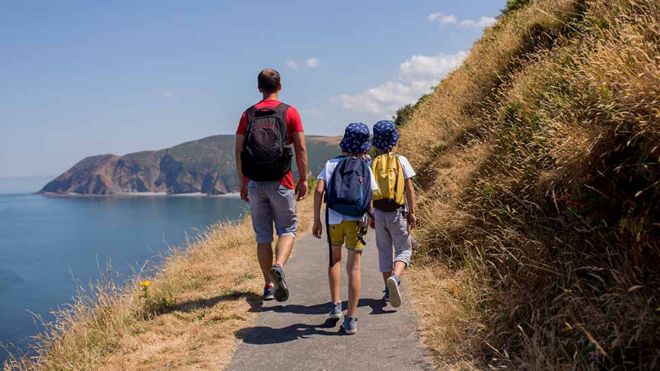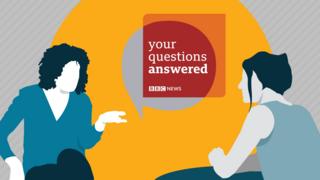
The chancellor has announced changes stamp duty, VAT, eating out and the furlough scheme.
So, how could you be affected?
Questions and answers
Support bubbles
Your questions
Skip Support bubbles-
When will people be allowed to resume physical contact with a loved one in a bubble scenario? I miss my boyfriend of 18 months as we live apart. from Sue in Chester
-
Can I have my grandson overnight? I am a single grandparent living on the ground floor in my own house, however I have a lodger who lives on the second floor. from Teresa
-
If I have been on the vulnerable list, when can I have people in my house to sleep over and can I go to family to sleep over at their house? From Karen Dowling in Birmingham
All about coronavirus
Your questions
Skip All about coronavirus-
What is the coronavirus? from Caitlin in Leeds Most asked
-
Once you've had coronavirus will you then be immune? from Denise Mitchell in Bicester Most asked
-
What is the incubation period for the coronavirus? from Gillian Gibs
 Michelle Roberts Health online editor
Michelle Roberts Health online editorScientists have said that the “incubation period” - the time between catching the virus and starting to show symptoms - is five days on average. However, some people can have symptoms earlier or much later than this.
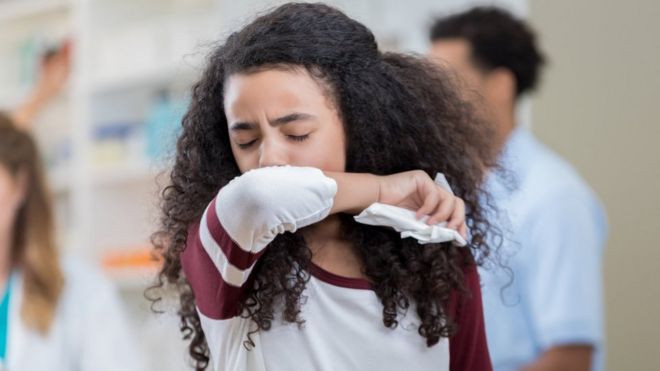
The World Health Organization advises that the incubation period can last up to 14 days. But some researchers say it may be up to 24 days.
Knowing and understanding the incubation period is very important. It allows doctors and health authorities to introduce more effective ways to control the spread of the virus.
-
Is coronavirus more infectious than flu? from Merry Fitzpatrick in Sydney
 Michelle Roberts Health online editor
Michelle Roberts Health online editorBoth viruses are highly contagious.
On average, it's thought people with the coronavirus infect two to three other people, while those with flu pass it on to about one other person.
There are simple steps you can take to stop the spread of flu and coronavirus:
- Wash your hands often with soap and water
If you have returned from holiday abroad and have to self-isolate in quarantine, you will not automatically qualify for Statutory Sick Pay (SSP), so it's possible you might have to make arrangements with your employer if you cannot work from home.
- Catch coughs and sneezes in a tissue and then put it in the bin
-
How long are you ill for? from Nita in Maidstone
-
Asymptomatic people are regarded as "silent spreaders" - what proportion of the population are they estimated to be and how do you find them? From Val Holland in Worcester
-
Why are diabetics not included in the clinically extremely vulnerable patients, and will the list be refreshed? from Derek Roberts in Hornchurch, Essex
-
How dangerous is coronavirus for people with asthma? from Lesley-Anne in Falkirk
 Michelle Roberts Health online editor
Michelle Roberts Health online editorAsthma UK's advice is to keep taking your daily preventer inhaler (usually brown) as prescribed. This will help cut the risk of an asthma attack being triggered by any respiratory virus, including coronavirus.
Carry your blue reliever inhaler with you every day, in case you feel your asthma symptoms flaring up. If your asthma is getting worse and there is a risk you might have coronavirus, contact the online NHS 111 coronavirus service.
-
Are otherwise healthy disabled people more at risk from coronavirus? from Abigail Ireland in Stockport
 BBC News Health team
BBC News Health teamCoronavirus can be more severe in older people and those with pre-existing conditions such as heart and lung illnesses, or diabetes.
There is no evidence that disabled people who are otherwise healthy - and who don't, for instance, have respiratory problems - are at greater risk from coronavirus.
-
Will people who've have had pneumonia experience milder coronavirus symptoms? from Marje in Montreal
 BBC News Health team
BBC News Health teamCovid-19 can, in a small number of cases, lead to pneumonia, most notably in people with pre-existing lung conditions.
But as this is a new virus, no-one will have any immunity to it, whether they have previously had pneumonia, or any other form of coronavirus such as Sars.
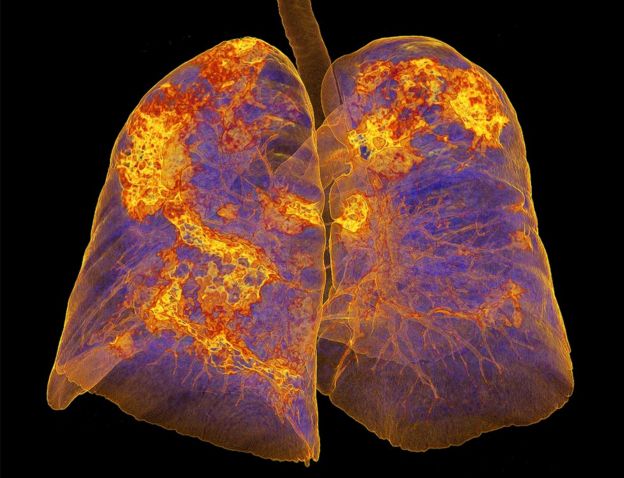
-
With key workers wearing some sort of mask, how are deaf people who lip-read supposed to understand what is being said? From Margaret Roll in Clevedon
Wearing masks has become commonplace not just in hospitals but also among the general public.
It presents major challenges for some deaf people who rely on lip-reading to communicate, but who also need to stay safe from catching the virus, especially if in a hospital setting.
The charity Action on Hearing Loss says there are some clinically approved see-through covered face masks that help enable lip-reading. However, they do not provide enough protection against aerosols spread by coronavirus, and wouldn’t be right for health and social care workers to use during this pandemic.
They say it might be worth using a small whiteboard to communicate. There are also some subtitling or captioning apps that may provide some help.
Protecting myself and others
Your questions
Skip Protecting myself and others-
Is a scarf as a mouth covering enough for public transport? From Rachel in Exeter
 BBC News Health team
BBC News Health teamYes. According to the advice from Public Health England, a scarf or a bandana tied around your head is fine.
The important thing is that it covers both your mouth and your nose – and that you can breathe easily.
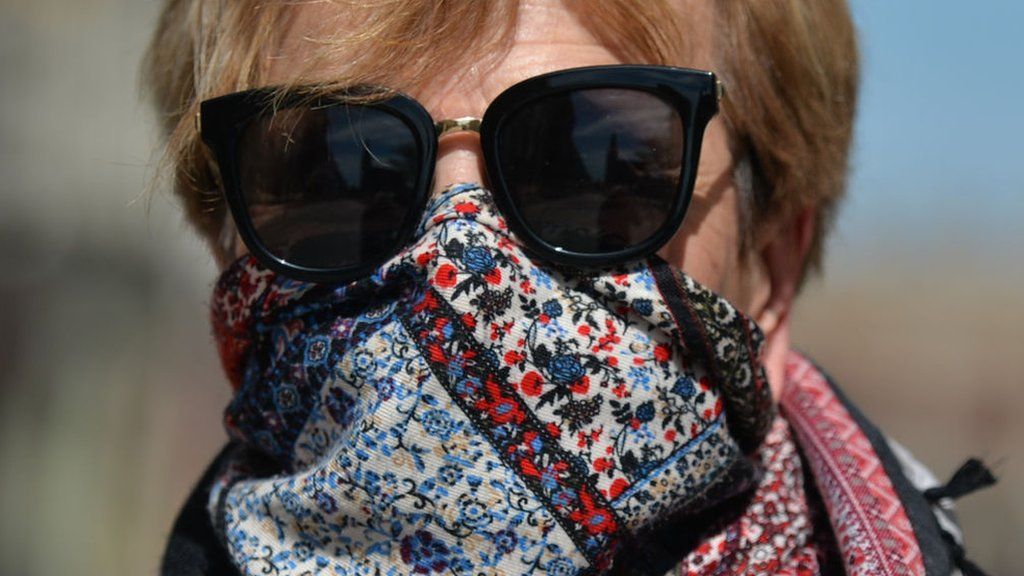
Whether you are wearing a scarf or a homemade mask, the advice is that you should continue to maintain other hygiene measures. So wash your hands, or use hand sanitiser before you put your face covering on and off, and don’t touch your eyes, nose or mouth at all.
Wash the face coverings after each time you use them (for this reason it might be worth avoiding textiles which need special care, such as wool or silk) and keep the used face coverings in a plastic bag until you can wash them.
-
Why are governments going to such extreme measures to combat coronavirus when flu appears to be more deadly? from Lorraine Smith in Harlow
 James Gallagher Health correspondent
James Gallagher Health correspondentQuarantining cities and telling people to stay at home may seem extreme, but the alternative is to let the virus spread unrestrained.
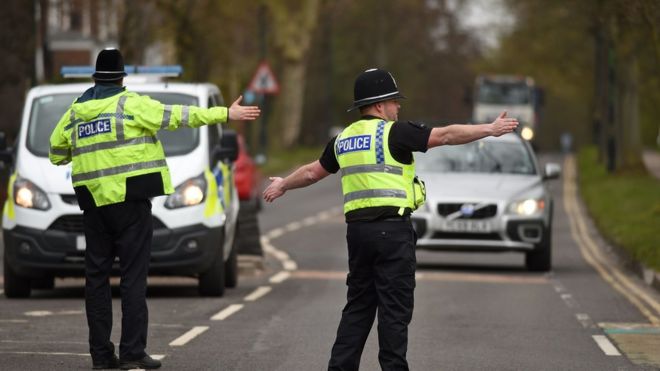
There is no vaccine for this new virus, as there is for flu, which makes elderly people and those with underlying health conditions very vulnerable to its effects.
-
What should I do if someone I live with is self-isolating? from Graham Wright in London
 BBC News Health team
BBC News Health teamIf you’re living with someone who’s self-isolating, you should keep all contact to a minimum and, if possible, not be in the same room together.
The person self-isolating should stay in a well-ventilated room with a window that can be opened, and keep away from other people in the house.
If you live with someone who has symptoms, you'll also need to self-isolate for 14 days from the day their symptoms started - this is how long it can take for symptoms to appear.
If you get symptoms, self-isolate for seven days from when your symptoms start, even if it means you're self-isolating for longer than 14 days. If you do not get symptoms, you can stop self-isolating after 14 days.
-
Should people stop having sex? from Martha Menschel in Las Vegas
If you live with your partner, they count as being part of your household. If neither of you is showing coronavirus symptoms and you are already in close contact, having sex won't increase the likelihood of you catching the virus from one another. If one person does have symptoms, they should be self-isolating in a separate room.
Using contraception such as condoms won't alter your risk of catching the virus, as having sex will bring you into close physical contact anyway.
"If you are going to touch each other's genitals it's likely that you will potentially be kissing at the same time - and we know the virus is passed through saliva," Dr Alex George told the BBC's Newsbeat.
"Essentially, any possibility of transfer of coronavirus - from your mouth to your hands, to genitals, to someone else's nose or mouth - increases the risk of passing on coronavirus."
-
How are there still so many new cases of coronavirus occurring during the lockdown? Is it known if it is from people not observing the rules? From Susan Pugsley in Sanford
-
How will we know the difference between a genuine contact tracer and a potential scammer? from James Wilson in Nuneaton
Me and my family
Your questions
Skip Me and my family-
I am five months pregnant and want to understand the risk to the baby if I get infected? from a BBC website reader
 James Gallagher Health correspondent
James Gallagher Health correspondentPregnant women are being advised by the UK government to stay at home and keep contact with others to a minimum. However, they should attend antenatal clinics as normal.
There is no evidence to suggest that pregnant women are more likely to get coronavirus. But, for a small number of women, being pregnant may change the way their body deals with a severe viral infection.
The government’s chief medical adviser says this is a precautionary measure until scientists find out more about the virus and that "infections and pregnancy are not a good combination in general”.
-
I am breastfeeding my five-month-old baby - what should I do if I get coronavirus? from Maeve McGoldrick
 James Gallagher Health correspondent
James Gallagher Health correspondentMothers pass on protection from infection to their babies through their breast milk.
If your body is producing antibodies to fight the infection, these would be passed on through breastfeeding.
Breastfeeding mums should follow the same advice as anyone else over reducing risk - cover your mouth when you sneeze and cough, throw away used tissues straight away and wash hands frequently, while trying to avoid touching your eyes, nose or mouth with unwashed hands.
-
Is it possible to catch coronavirus from a pet dog or cat? from Javed
-
What is the risk to children? from Louise in London
 BBC News Health team
BBC News Health teamIn general, children appear to be relatively unaffected by coronavirus, according to data from China and other countries.
This may be because they are able to shake off the infection or have no symptoms or only very mild ones similar to a cold.
However, children with underlying lung problems, such as asthma, may have to be more careful.
All schools in the UK are currently closed, except for vulnerable pupils or children of key workers.
Leaving the house
Your questions
Skip Leaving the house-
My children live with their mother, but visit me. I live about 190 miles from them. Is it legitimate travel for me to drive to collect them? from Mark in Swansea
Yes it is.
Government guidance on staying at home says: "Where parents do not live in the same household, children under 18 can be moved between their parents' homes."
If neither parent nor child is showing symptoms of the virus or self-isolating, children of separated parents are still allowed to stay with either of them.
However, the Family Division of the High Court has said that, in England and Wales, if one parent is worried that moving their child would be going against public health advice, they may "vary the arrangement to one that they consider to be safe", even if the other parent does not agree.
Where this is the case, family courts will expect parents to allow contact by video chat or phone.
-
Can I visit Germany for a three-day business trip? From Kevin in Stockport
My finances
Your questions
Skip My finances-
Will lenders allow people with mortgages to delay payments during the outbreak? from Clare Waters
 Simon Gompertz Personal finance correspondent
Simon Gompertz Personal finance correspondentPeople affected by coronavirus will be able to delay their mortgage payments for up to three months.
It is important to bear in mind that any interest and capital repayments which are missed, will be added to the mortgage balance.
This means that any future monthly mortgage bills are likely to be slightly higher.
-
How do you get gas and electricity if you are on a pre-payment meter and can't get to a post office to top it up? from David E P Dennis
 Simon Gompertz Personal finance correspondent
Simon Gompertz Personal finance correspondentEnergy companies have promised to help you if you have a pre-payment meter. So you may be able to authorise a friend to top up your energy card for you.
You could also ask your supplier to send you a card by post which is already topped up. The government says that if it's urgent the supplier should be able to add credit directly to your account. You should be able to top up online as well.
And you will have to pay back any credit your supplier gives you. So you should contact them to ask about when and how to do this.
-
What should I do as I have not received a refund for a cancelled flight? From Susan in Offley
If your flight is cancelled, you are entitled to a full refund to the original form of payment within seven days, although many airlines are struggling to meet that deadline.
Ryanair, for example, says customers who want a cash refund will receive it ''in due course'' as it is dealing with a much higher volume of requests than usual, with fewer staff.
Many airlines are trying to avoid giving refunds and are offering vouchers for another flight or a free re-booking instead.
If the airline later folds, the voucher will probably become invalid. And any rebooking could affect the terms of your travel insurance.
Work issues
Your questions
Skip Work issues-
I am a self-employed music teacher. If I cannot work, will the government still help the self-employed financially until October? from Jess in Essex
-
My company wants me to return to work within the lockdown period. Is this legal? From Jim Bridgeman in Kettering
-
I'm self-employed. Can I claim benefits if I can't work due to the virus? from Mark Gribby in Nottingham
 Simon Gompertz Personal finance correspondent
Simon Gompertz Personal finance correspondentSelf-employed people who have symptoms or have been told to self-isolate may apply for two benefits - universal credit or employment and support allowance.
Normally, you would be eligible after four days of being ill. However, the government has responded to the spread of coronavirus by saying that companies will temporarily pay SSP from the first day off.
But charities are worried that there is still a five-week delay before universal credit is paid.
-
Who is eligible for universal credit? from Mario in London
-
If you have to self-isolate will you only get statutory sick pay, or will your employer pay your salary? from Laura White in Herefordshire
Back to school
Your questions
Skip Back to school-
What happened to the plan to provide all vulnerable school students with a laptop? from David in Witham, Essex
-
Social distancing is very difficult in schools. I'm a primary school teacher - shouldn't I be wearing a mask? from Liezel
-
Will schools stay open during the school summer holidays? from Nic in Burgess Hill, West Sussex
Student issues
Your questions
Skip Student issues-
I am supposed to be starting university in September. Is there any point in me going this year or shall I defer until next year? from Danny in Scunthorpe
-
Can university students get their tuition fee refunded for disruptions to teaching because of Covid-19? from Sophie in Liverpool
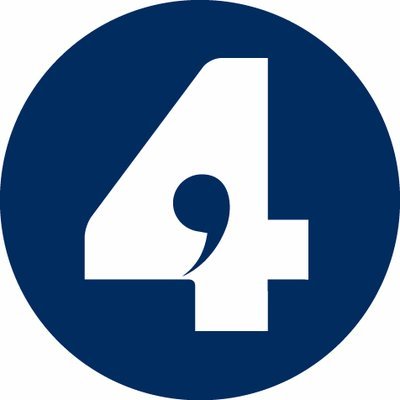 Moneybox team BBC Radio 4
Moneybox team BBC Radio 4The Department for Education has indicated that it is possible for students to get their fees back.
In a statement, it said that if universities are “unable to facilitate adequate online tuition then it would be unacceptable for students to be charged for any additional terms”.
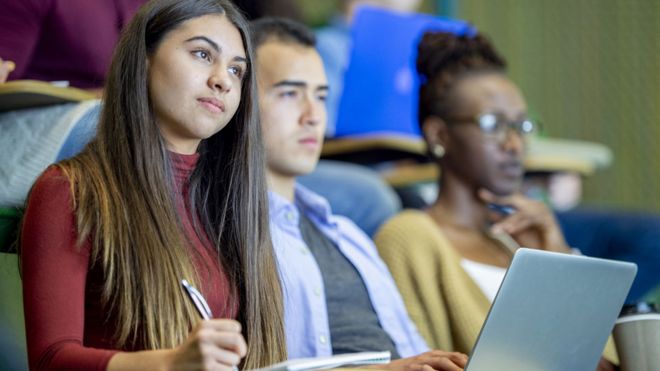
To claim a refund, students first need to complain directly to their university. If that is unsuccessful then students in England or Wales can lodge an appeal with the Office of the Independent Adjudicator (OIA).
If your university is in Scotland then it’s the SPSO (Scottish Public Services Ombudsman) and for Northern Ireland, you go to the NIPSO (Northern Ireland Public Services Ombudsman). Students will need a “completions procedure form” from their university in order to file an appeal.
-
Can you cancel your student property lease early - and if so, how? From Honor in Edinburgh
 Moneybox team BBC Radio 4
Moneybox team BBC Radio 4Most students have gone home to self-isolate, leaving their student properties empty but they still have to pay rent.
If you’re worried about paying rent for an empty student property, first of all check your tenancy agreement. Some contracts will have a “break clause” which will allow you to cancel your lease early if you give your landlord enough notice.
If you don’t have a “break clause”, you can always speak to your landlord and ask for a “reduced payment plan”. This could mean you pay less rent each month.
Life after lockdown
Your questions
Skip Life after lockdown-
Why are gyms, leisure centres and other fitness facilities being excluded from this round of restrictions when their links to improved physical and mental health are so obvious? from James Shillaker in Burgess Hill
 Nick Triggle Health correspondent
Nick Triggle Health correspondentIt is a good question. Indoor gyms are obviously good for health and wellbeing, but there’s concern Covid-19 transmission will be more difficult to control in them because of the physical exertion by gym-goers, the damp conditions in changing rooms and the fact that social distancing is generally less easy.
The government hopes indoor gyms, swimming pools and spas - so called “close proximity” venues - can reopen in England later in July. But PM Boris Johnson says outdoor gyms and playgrounds can reopen from Saturday 4 July.
In Northern Ireland, indoor gyms will reopen on 10 July. In Scotland, gyms will only reopen in Phase Three of the country’s Covid route map – which is not expected until mid-August. No date has been set for the reopening of indoor gyms in Wales.
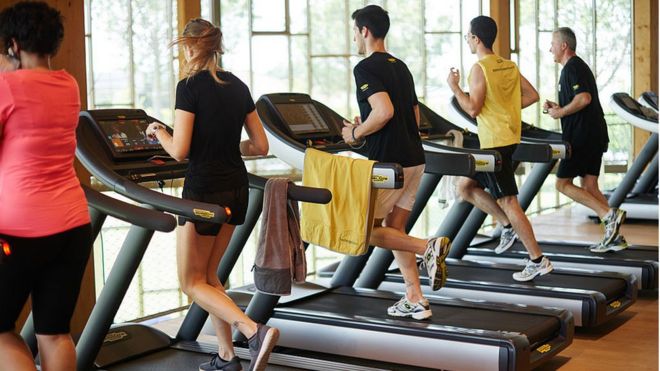
-
How many households can share a self-catered house? And are they allowed to use a shared swimming pool and hot tub? from Joanna McCaul in Rickmansworth, London
-
Can I travel to and stay in my second home? It's not a holiday home, I live in the Midlands, but work in the North East during the week. Travelling is not an option as it would mean an eight or nine-hour round trip every day. From Mark Dunn in Cannock
-
My daughter is a driving instructor. When will she be able to start teaching her students again? from Valerie in Haslemere
The government has now announced that driving lessons and theory tests will be able to resume in England, Scotland and Wales from 4 July. Driving tests will resume from 22 July.
Other than emergency training and tests for critical workers, no driving instruction or driving tests have been taking place since the beginning of lockdown. They have not been able to restart because the risk of transmitting the virus in a car is higher.
In Northern Ireland, where driving instruction is the responsibility of the Driver and Vehicle Agency, tests and lessons remain suspended.
-
The number of new cases may have fallen to pre-lockdown levels. But the virus is still equally contagious and has the potential to spread exponentially - just as it did before lockdown. So what's changed? from Tomas René in Hastings
 Nick Triggle Health correspondent
Nick Triggle Health correspondentLockdown is essentially a blunt tool. With the testing and tracing system now in place, the idea is to be much more forensic in trying to contain the virus.
The government now has the capacity to carry out 200,000 tests a day - in March it was only a few thousand. We now have an extensive network of contact tracers.
On top of this, social distancing continues and lots of measures - like face coverings, and screens in shops - will limit the spread of the virus. So the picture is significantly different from how it was in March.
-
Will churches be able to reopen for services from 4 July? from Danny Smith in St Albans
-
If it is safe enough to go to the cinema why are schools still not allowed to take more than 25% of any year group in? from Lydia in Bath
-
When will UK prisons be open again for social visits? from Hazel
-
What are my chances of getting a job in lockdown/when lockdown is over? from Jess in Essex
Testing, tracking and tracing
Your questions
Skip Testing, tracking and tracing-
How will people who don't have a mobile phone be able to submit that they have symptoms? From Lorna Miller in Liverpool
-
If an online grocery delivery driver tests positive for Covid-19, would they need to let the Test and Trace service know every customer they’ve delivered to because they will have handled the food or bags? From Jan in Wiltshire
Quarantine
Your questions
Skip Quarantine-
Can I travel to Ireland and then onto another country, then back to the UK via Ireland to avoid the quarantine? from Chris McCann in Sandhurst
-
Do key workers have to quarantine? From Mateusz in London
-
I will be back in the UK after 8 June, therefore I will have to quarantine. Will my flatmates have to quarantine as well because of me? From Matteo in London
Unless your flatmates were travelling with you, they do not need to self-isolate or quarantine with you.
However, you must avoid contact with them and minimise the time you spend in shared spaces like kitchens, bathrooms and sitting areas.
You should stay in a well-ventilated room with a window to the outside that can be opened, separate from your flatmates, and if you can, you should use a separate bathroom from them. If you do need to share these facilities, regular cleaning will be required after each person has used them.
Make sure you use separate towels from the other people in your house, both for bathing and showering, and for washing your hands.
-
If I have to quarantine after a holiday and can’t work from home will I get paid? From Emma in Portishead, Bristol
Not necessarily.
If you have returned from holiday abroad and have to self-isolate in quarantine, you will not automatically qualify for Statutory Sick Pay (SSP), so it's possible you might have to take the extra time off as annual leave, or else as unpaid leave.
The Department of Work and Pensions says that anyone planning to travel should do so in the knowledge that they will be required to self-isolate on their return.
It adds that employers and staff should discuss and agree any arrangements in advance, and urges employers to take socially responsible decisions.
Meanwhile, the Foreign & Commonwealth Office is still advising UK nationals against taking all but essential international travel.
What do I need to know about the coronavirus?
What questions do you have about coronavirus? Do you want to ask it on BBC News? Get in touch and we may ask you to send us a video of you asking your question.
In some cases, your question will be published, displaying your name, age and location as you provide it, unless you state otherwise. Your contact details will never be published. Please ensure you have read our terms & conditions and privacy policy.
Use this form to ask your question:
If you are reading this and can't see the form above you will need to visit the mobile version of the BBC website to submit your question or send them via email to YourQuestions@bbc.co.uk. Please include your name, age and location with any question you send in.

